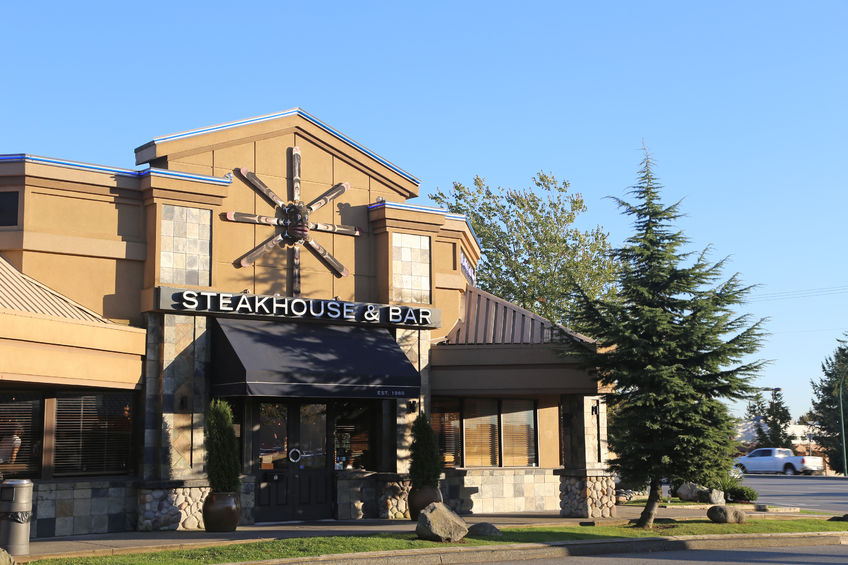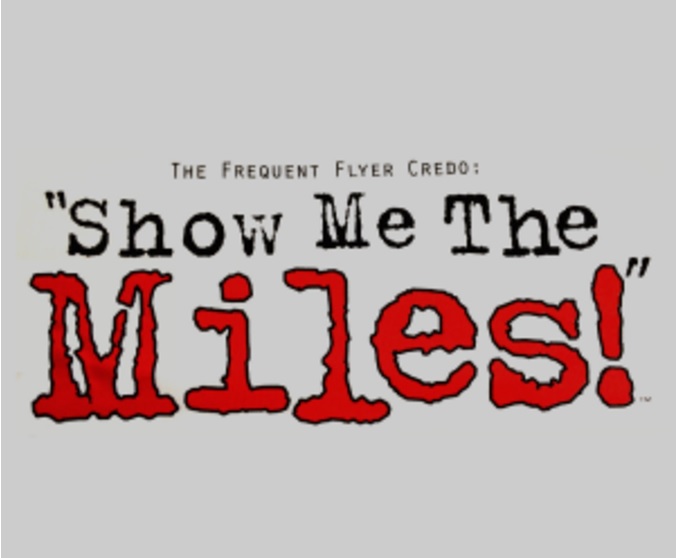I’ve always loved being able to put lots of work charges on my personal credit card and get reimbursed. There’s a risk involved, of course, what if you spend money and your accounting department kicks back the charges? What if your business.. goes out of business before you’re reimbursed?
There are certainly stories like that, although the most common is companies that are slow to reimburse which is why the old Diners Club benefit of two billing cycles to pay was so great. You always had at least 60 days from statement close before your bill was due, so you knew your reimbursements would happen. You’d even have time to bring the reimbursement check to the bank (this was before mobile deposit via app).
Life on the road, when you don’t have to use a company credit card, lets you rack up plenty of miles. But it’s nothing like what one waiter did at a steakhouse.

Copyright: payphoto / 123RF Stock Photo
Go Big Or Go Home
A recent discussion in Richard Kerr‘s excellent Travel Hacking 101 Facebook group brought up this story:
When I worked in a upscale steak house when a table payed in cash I would run my card and bank the miles. Clearly correct change was given and gratuity amount for tipping out support staff at the end of the night. Next day deposit the cash and when it cleared I would send a payment in that amount to CC so no interest charge!
When I left I had just shy of a million miles…800k prob…funded my travels well into my late 20s
Imagine, though, if this restaurant participated in iDine/Rewards Network dining for miles…

Credit: Frequent Flyer Originals
Definitely Risking His Job…
This is a little different than using your credit card for business expenses. Swapping out your own credit card for customer bills when they’re paying cash presents a different challenge — you’re actually imposing credit card processing costs on your employer. This gentleman was lucky, I imagine if the restaurant found out (at least someone high up enough to care) that he might have been fired.
It sounds like this wasn’t recent, so probably didn’t involve double or triple points for dining (spending category bonuses — except for the old Delta ‘double miles on everyday spend’ — are a relatively recent phenomenon). So we’re talking about $800,000 in bills over time. At, say, 2% credit card fees he may have cost his employer to incur $16,000 in additional expenses.
Lots of mixed reaction in the Facebook group, I’d say that on balance discussion tilts against this person though there’s appreciation for the creativity of the scheme. It certainly highlights the moral issues that some people face in their pursuit of miles and points.
Are You Any More Moral in Your Quest for Miles?
How clean are your hands? Maybe you’ve never caused their employer to pick up $16,000 in credit card merchant fees so you could earn miles. But did you ever buy an airline ticket that was more than the cheapest available to stay on your preferred airline?
There are plenty of companies who require employees to book the cheapest fare. If yours does, did you ever discover your preferred airline was more expensive and so you waited to buy your ticket until the last minute figuring that the price of all airlines would go up, and you’d be able to stick with your carrier of choice?
These are the grey areas we confront every single day because loyalty programs were specifically designed to create conflicts of interest. Southwest Airlines early on had the ‘secretaries program’ where they rewarded the assistants booking travel for putting their bosses on Southwest. And the airline one year became the biggest liquor distributor in the State of Texas offering an option for a cheap fare, or a more expensive one with take-home liquor. Guess which one business travelers chose?


Sorry, but all the examples you gave are plain and simple theft or fraud.
– Making the employer pay $16000 for your miles is clearly theft
– Booking a more expensive fare out of policy in order to earn miles is fraud
– Deliberately waiting until the last moment to buy a ticket, when you could and should have bought earlier in order to earn miles, also clearly fraud.
Really, the whole expenses thing boils down to whether the company has a strict policy, in which case your alternative is to follow it precisely, or the company has a flexible policy, in which case you discuss with the boss what you are proposing to do, and seek approval.
There’s no such thing as half fraud and half ok.
But agreed that the programs are all designed to give tools to unscrupulous employees.
Or how about working at a National Chain? Purchase discount gift cards via ebay or cardcash saving 12-35% and getting the miles for that purchase. Might apply at Olive Garden soon.
Credit card fees are baked into the prices anywhere that accepts them. That said he /is/ costing them money since presumably so is the expectation of what exact percentage of people will pay by card at a large chain. If I were this guy, I’d ask a low level manager to clear it as an offhand comment … just say “hey do you mind if a table pays by cash if I run my own personal card to rack up the miles once in a while?” Now he can say he’s cleared his scheme with management and they can’t/shouldn’t fire him for it … though they could tell him to stop and at that point he would have to.
Funny how the same people who praise trump for being “business savvy” (like finding loopholes to avoid paying $1b in taxes) and vote for him, find it outrageous that a low level employee is also being “business savvy” and finding opportunities…
You’ll find a lot of opinions on this so I’ll add mine. I have booked more expensive airline tickets to stay on my airline of choice. Of course I also benefit from free food for lunch in the lounge, free checked bags and being able to get more work done on the plane with a better seat. I think any minor difference in price was justified and ethical in the big picture. There are other factors as well. For example I tend to chose nicer hotels than the cheapest option at times as I try to keep my lodging at the same level of my own home which I think is OK. Everyone has their own moral compass I guess. To me most of this is minor compared to some of the lines that I’ve seen some bloggers promote to outright steal from airlines to game a few miles 🙂
@daninmci +1
I use the rule “if I was paying my own way, what flight/would I book?” Just because.a flight or hotel isnt the cheapest doesn’t mean it’s not the best value (given connections, frequent flyer benefits, etc)
@Matt B- agreed. I always try to treat any customer’s/employer’s business as though it were my own. If I have discretion and wouldn’t do it in my own (or if I don’t want to have to defend it in litigation/the press), I don’t do it on my corporate card.
I’ve worked at a variety of companies and those companies have had a variety of travel policies.
Generally speaking, the more reasonable the policy, the easier it is to follow the policy in the real world without having to resort to shenanigans.
I worked for one major (and successful) company where we were allowed $15 for dinner. In most large cities, that leaves you eating fast food, which just isn’t an acceptable policy for executive roles. So, of course, we all engaged in creative expense account filing.
Another firm I worked for had a very reasonable dining policy, where they said “don’t be ridiculous”. And we weren’t, so instead of getting shenanigans, they got a real accounting of what was being spent where.
And this is really an issue that speaks to larger macroeconomic trends. If organizations treat their employees with respect and compensate them fairly, the employees will usually do their best to treat the company’s assets as their own. If the company doesn’t, they will face consequences. A colleague who’d previously been with one of the world’s largest entertainment companies described the mantra amongst employees was “If you’re not screwing ________, they’re screwing you.”
I had a company CC and earned miles. When I retired, it took 4 transfers because there was a finite number of miles that could be transferred at a time. Unfortunately, the actual Air travel expense was charged to a special CC number. No miles were involved. We were averaging $1,500,000 in charges per month in air travel. This was confirmed by the manager of the travel department. However, in regular travel, I managed to enter the million miler club. I’m 75k short of 2mil.
Ff programs have always created a conflict of interest between employee and employer. Prior to revenue-based programs, employees might take business trips that they otherwise might not have to earn miles or status.
Revenue-based programs have taken the potential conflicts to another level. These programs offer huge rewards to big spenders of other people’s money while offering very little to those who are frugal. This can influence subconscious behaviour as well as conscious decisions. Perhaps this is what Kirby was referring to when he stated (without explanation or follow up from analysts on the earnings call) that going to a revenue-based ff program would have a positive effect on revenue.
As I pointed out when delta first adopted a revenue-based system, the conflicts of interest are potentially significant enough that an employee should disclose the relationship with a ff program on the corporate conflict of interest forms many companies use. Revenue-based programs put employees in a tough spot of potentially being second guessed somewhere down the road by bosses or internal auditors..
You post about FD fares and ask a question abt Moral quest. hehehe